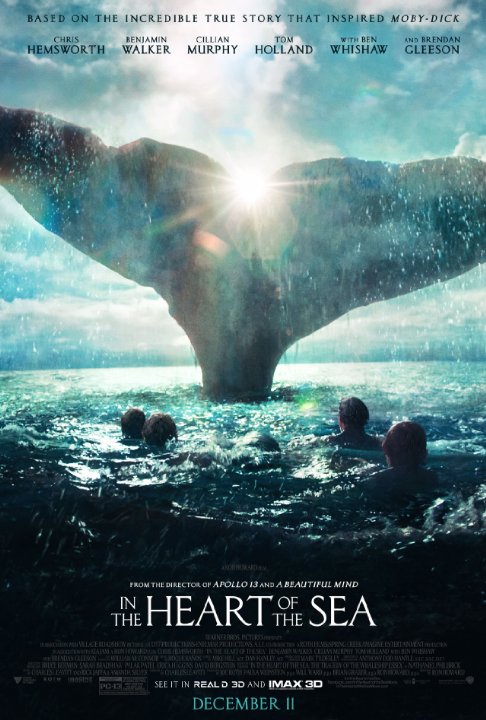Rating of
2.5/4
‘In The Heart Of The Sea’ – The Hollywood Version
MovieMike - wrote on 12/12/15
I had read the book of the same name by Nathaniel Philbrick a couple years ago. I was so taken with this narrative, I read the book multiple times to take it all in. I was thrilled to find out that it had been optioned for a movie version – and doubly pleased to learn that it would be helmed by Ron Howard. If you’re unaware, the tale of the Whaleship Essex, was an accounting of actual events of the Nantucket based whaling ship that became (in part) the basis for Herman Melville’s ‘Moby Dick’.
For the film, screenplay and writing credits were handled by Charles Leavitt (who also penned screenplays for ‘Blood Diamond’ and ‘K-PAX’). Leads for the Captain of the Essex and the First Mate were filled by Benjamin Walker (‘Abraham Lincoln: Vampire Hunter’) and Chris Hemsworth (‘Thor’ and ‘Snow White and the Huntsman’) respectively. So based on all of this, one should assume there’s the potential for a pretty good film here, right? Well, not so fast…
While I enjoyed most of the authentic feel of the film, as it takes us back to the days before electricity and into the world of the then waning whaling industry, the actual story line had been reworked to make this tale appear to be more closely related to ‘Moby Dick’ than warranted. Philbrick’s book delved deeper into issues such as class, race, social status, and the effects of long sea journeys on both the sailors and those left behind. Leavitt chooses to gloss over most of this except for the relationship between the Captain and the First Mate. Even at that, he fails to follow up on the continued contention between these two players, even after the wrecking of their ship. The crew’s wanton destruction of Charles Island (prior to the whale attack) is left out completely. The subject of cannibalism is treated so gingerly here, the ramifications of who survives is examined in all too little detail. There were actually 7 men consumed by their fellow sailors.
I realize it’s difficult to cram a 238 page book into a two-hour film, but the adjustments here to align this story so closely with Melville’s work make for a less authentic work. A dramatic point that was missed almost entirely was that, up until that point, never had any whale ever directly attacked a whaling ship. Also missed was the lack of knowledge of the Pacific by the crew and their fear of rumored cannibalism on some of the remote islands that would have otherwise offered refuge in a few short days sail from the wreckage site (how’s that for irony?) Additionally, it was actually Captain Pollard that shares his narrative with Melville, not Tom Nickerson. Owen Chase wrote his own narrative shortly after his return from the disaster. Apparently, there were personal disagreements over all of these separate accountings. Philbrick’s own work is based on a study of all the available history and various accounts collected over the ensuing years.
I left the theater feeling a little cheated, because I was more familiar with the actual tale. Perhaps that makes me biased in this review. It will be interesting to see how the general public reacts to this offering. Then we will see if the ‘Hollywood’ version manages to impress the masses.




